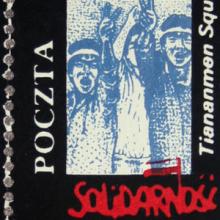Popular Culture

Short Teaching Module: Remembering Tiananmen Square
Although China is located quite far from Eastern Europe, dissidents in Eastern Europe identified with the struggles by opposition leaders in China and used images of the 1989 Tiananmen Square uprising to reinforce memories of resistance in Eastern Europe.
Soviet Dissidents and the "Brain Drain"
In the beginning of 1989, Henry Kissinger met with Mikhail Gorbachev for an informal conversation about the future of U.S.-Soviet cooperation, particularly concerning economic opportunities in the Soviet Union. The problem for U.S.-Soviet trade was the Jackson-Vanik Amendment to the 1974 U.S.
Plans for Reorganizing Solidarity
Prior to the historic roundtable talks that took place between February and April 1989 in Poland, preparations took place on many levels.
Mikhail Gorbachev Reports on the Trilateral Commission
During the significant changes that were brewing in the Soviet Union and Eastern Europe in the 1980s, Mikhail Gorbachev (leader of the Soviet Union) met with members of the Trilateral Commission, a nongovernmental organization founded in 1973 by private citizens of Japan, North America, and Europ
The Soviet withdrawal from Afghanistan
On 25 December 1979, the Soviet Union deployed its army in Afghanistan, in support of the Afghan Communist government against a group of Muslim opponents.
Hungary announces 1956 is a "People's Uprising"
On 23 June 1988, the Hungarian Socialist Workers' Party (Communist) Central Committee established a committee to analyze Hungary's political, economic and social development during the preceding thirty years. The issue of the 1956 Soviet invasion of Hungary became a political flashpoint.
The Soviet Union over the Next Four Years
In early 1989, shortly after President George H. W. Bush had taken office, the office of US ambassador to the Soviet Union Jack F. Matlock sent this message to the attention of the new National Security Advisor General Brent Scowcroft.
A Yugoslav Ambassador reports on the current situation in Romania
As the government of Nicolae Ceauşescu in Romania began to collapse in a wave of strikes and riots, Moscow looked on with growing concern. Shortly before Christmas 1989, the Soviet Deputy Minister of Foreign Affairs met with the Yugoslav ambassador to the Soviet Union to discuss the situation.
UN Security Council on the Civil War in Yugoslavia
In 1990, the Yugoslav Communist Party divided into several separate parties, one for each of the six Yugoslav Republics. Tensions among the ethnic groups of Yugoslavia, divided among the republics, led to an outbreak of a civil war in 1991.
United Nation's Evaluation of the Peacekeeping Process in Yugoslavia
In 1990, the Yugoslav Communist Party divided into several separate parties, one for each of the six Yugoslav Republics. Tensions among the ethnic groups of Yugoslavia, divided among the republics, led to an outbreak of a civil war by 1991.